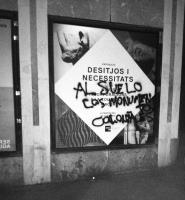 Decolonising a cultural institution does not just mean considering the matter and organising exhibitions and seminars. In the current context, decolonising a museum requires a constant effort to take a position in regard to the migratory control system; it requires accepting that it is impossible to continue programming activities and events while there is a total normalisation of the existence of Migrant Detention Centres, forced deportation flights on a mass and individual scale, individuals with semi-rights and anti-rights, and situations of extreme violence in border zones which are the local contexts where these projects are presented.
Decolonizing Museums, L'Internationale Online Issue 2, September 2015.
Decolonising a cultural institution does not just mean considering the matter and organising exhibitions and seminars. In the current context, decolonising a museum requires a constant effort to take a position in regard to the migratory control system; it requires accepting that it is impossible to continue programming activities and events while there is a total normalisation of the existence of Migrant Detention Centres, forced deportation flights on a mass and individual scale, individuals with semi-rights and anti-rights, and situations of extreme violence in border zones which are the local contexts where these projects are presented.
Decolonizing Museums, L'Internationale Online Issue 2, September 2015.
Games Without Borders
27.02.2016 | by Daniela Ortiz
![Liberation struggles, the 'Falling of the Empire’ and the birth [through images] of african nations Liberation struggles, the 'Falling of the Empire’ and the birth [through images] of african nations](https://www.buala.org/sites/default/files/imagecache/thumb/2016/01/filmerdc.jpg) The fortieth anniversary of Portuguese decolonisation of Africa has acted as a catalyst in discussing how Portugal ‘imagined’ colonial politics through moving images and how these propagandist portrayals began to be questioned by the Portuguese ‘Novo Cinema’. This can be seen in works that were censured and prohibited. Portuguese colonial cinematographic representations were later challenged by films made in the context of the liberation movements and by images that emerged out of the national cinematographic projection (Frodon) of the new Portuguese-speaking African countries.
The fortieth anniversary of Portuguese decolonisation of Africa has acted as a catalyst in discussing how Portugal ‘imagined’ colonial politics through moving images and how these propagandist portrayals began to be questioned by the Portuguese ‘Novo Cinema’. This can be seen in works that were censured and prohibited. Portuguese colonial cinematographic representations were later challenged by films made in the context of the liberation movements and by images that emerged out of the national cinematographic projection (Frodon) of the new Portuguese-speaking African countries.
Afroscreen
14.01.2016 | by Maria do Carmo Piçarra
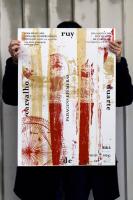 The exhibition is designed through a long voyage: from Southern Africa to Brazil, from Angola’s post‐independence to the author’s interior exile, from the desert to the sea, from his obsessions to his hesitations, from family commitments to a demanding loneliness, from the long war to the analysis of its implications, from his detailed field diaries to the game of mirrors between observer and observed.
The exhibition is designed through a long voyage: from Southern Africa to Brazil, from Angola’s post‐independence to the author’s interior exile, from the desert to the sea, from his obsessions to his hesitations, from family commitments to a demanding loneliness, from the long war to the analysis of its implications, from his detailed field diaries to the game of mirrors between observer and observed.
Ruy Duarte de Carvalho
25.11.2015 | by vários
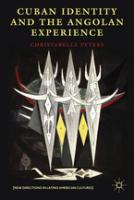 November 5, 1975 marked the 132nd year anniversary of the slave rebellion at the Triumvirato sugar plantation in Matanzas province, led by an enslaved African woman named Carlota. As one of the first acts in her liberation campaign, Carlota, accompanied by her captains, made her way to another plantation, Arcana, where a number of co-conspirators were being held in captivity following an uprising there in August of that year’s incendiary summer, when Africans and their descendants rose up against their enslavers throughout the province. As word spread of Carlota’s successes, one estate after another erupted in insurrection—San Miguel, Concepción, San Lorenzo, and San Rafael.
November 5, 1975 marked the 132nd year anniversary of the slave rebellion at the Triumvirato sugar plantation in Matanzas province, led by an enslaved African woman named Carlota. As one of the first acts in her liberation campaign, Carlota, accompanied by her captains, made her way to another plantation, Arcana, where a number of co-conspirators were being held in captivity following an uprising there in August of that year’s incendiary summer, when Africans and their descendants rose up against their enslavers throughout the province. As word spread of Carlota’s successes, one estate after another erupted in insurrection—San Miguel, Concepción, San Lorenzo, and San Rafael.
To read
15.11.2015 | by Christabelle Peters
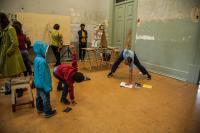 The subtitle of this issue works both ways: practices of resistance and spaces of invention, practices of invention and spaces of resistance. Even if we think in terms of productive power relations, we still use the word “resistance” in reference to those practices and spaces that emerge in moments of antagonist tension: e.g., when measures imposed by governmental institutions and the lack of perspectives for the future are individually and collectively felt as being oppressive.
The subtitle of this issue works both ways: practices of resistance and spaces of invention, practices of invention and spaces of resistance. Even if we think in terms of productive power relations, we still use the word “resistance” in reference to those practices and spaces that emerge in moments of antagonist tension: e.g., when measures imposed by governmental institutions and the lack of perspectives for the future are individually and collectively felt as being oppressive.
Games Without Borders
29.10.2015 | by vários
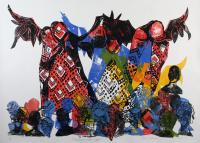 For other mediums such as sound art and video art to gain traction in Afrika, I think they need to be taken out of the gallery or museum environment and put into the mobile environment where people are. This entails modifying the model of collecting, where alternative commercial models better suited to mobile consumption of content come to the fore. The onus is on these new art platforms in Afrika to look deep within their cultures and societies and innovate the mediums themselves to make art more relevant for their communities.
For other mediums such as sound art and video art to gain traction in Afrika, I think they need to be taken out of the gallery or museum environment and put into the mobile environment where people are. This entails modifying the model of collecting, where alternative commercial models better suited to mobile consumption of content come to the fore. The onus is on these new art platforms in Afrika to look deep within their cultures and societies and innovate the mediums themselves to make art more relevant for their communities.
I'll visit
14.10.2015 | by Inês Valle
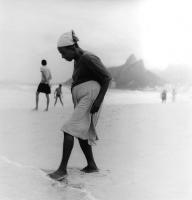 BRASIL is a photobook project that is the result of eight years of photographing culture, landscape, architecture and the visual magic I found in Rio de Janeiro, Sao Paulo and Salvador de Bahia. Made on analog film, the photographs are personal portraits that illuminate a fluid, syncopated, and complex contemporary Brazil, seen through the lens of my Rolleiflex camera.
BRASIL is a photobook project that is the result of eight years of photographing culture, landscape, architecture and the visual magic I found in Rio de Janeiro, Sao Paulo and Salvador de Bahia. Made on analog film, the photographs are personal portraits that illuminate a fluid, syncopated, and complex contemporary Brazil, seen through the lens of my Rolleiflex camera.
I'll visit
30.09.2015 | by Kristin Capp
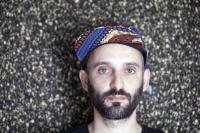 That same evening, Pedro Coquenão, aka Batida, had a Skype meeting planned with one of the activists to talk about “family stuff.” It obviously didn’t go through– his friend had been arrested. The 40 year-old Angolan-born, Lisboa-raised-and-based musician and creative is also an active voice and mind for an evolved and more equal Angolan society– a facet revealed by Coquenão throughout the years as a radio host in Portugal and a DIY documentary director and a musician, first as DJ Mpula and now as Batida.
That same evening, Pedro Coquenão, aka Batida, had a Skype meeting planned with one of the activists to talk about “family stuff.” It obviously didn’t go through– his friend had been arrested. The 40 year-old Angolan-born, Lisboa-raised-and-based musician and creative is also an active voice and mind for an evolved and more equal Angolan society– a facet revealed by Coquenão throughout the years as a radio host in Portugal and a DIY documentary director and a musician, first as DJ Mpula and now as Batida.
Face to face
17.09.2015 | by Ricardo Miguel Vieira
 If we accept that racism, sexism and other forms of oppression exist within language, then we must also recognize that it is through language – or languages – that oppression can be unmasked and combated. How? By allowing its structural, inclusive and persistent appeal to flow within the language towards creation and domesticated plurality. Linguistically created identities are not necessarily impenetrable frontiers or oppressive walls raised against the Other, but rather celebrations of every person’s multicolored singularity.
If we accept that racism, sexism and other forms of oppression exist within language, then we must also recognize that it is through language – or languages – that oppression can be unmasked and combated. How? By allowing its structural, inclusive and persistent appeal to flow within the language towards creation and domesticated plurality. Linguistically created identities are not necessarily impenetrable frontiers or oppressive walls raised against the Other, but rather celebrations of every person’s multicolored singularity.
To read
17.08.2015 | by Hugo Monteiro
 From a queer perspective, their analysis through the prism of the intersection between different categories of power, such as race, gender, and sexuality is certainly of great interest, as is realizing that both have influenced, and still influence, several queer "black" visual and musical artistic expressions, in the USA and the UK as well as in Jamaica, such as soul, hip hop, rap, bouncing, voguing..
From a queer perspective, their analysis through the prism of the intersection between different categories of power, such as race, gender, and sexuality is certainly of great interest, as is realizing that both have influenced, and still influence, several queer "black" visual and musical artistic expressions, in the USA and the UK as well as in Jamaica, such as soul, hip hop, rap, bouncing, voguing..
Afroscreen
09.07.2015 | by Ricke Merighi and Pedro Marum
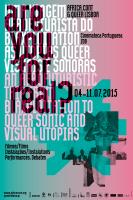 We resume our exploration of African queer cinema, thus extending the Queer Focus on Africa cycle featured in the Queer Lisboa festival last year. This time, we’re leaving Africa proper behind for the American and British world, thus reiterating one of our premises... the extension of "African" and "African-ness" that is part of AFRICA.CONT, a cultural force abroad in the world, much as a current in the ocean: integral to the whole but with movements and temperatures all its own - in the beautiful imagery of Achille Mbembe. We are certainly eager to explore the realities that this current embodies in its Central and South American, European and Asian diasporas.
We resume our exploration of African queer cinema, thus extending the Queer Focus on Africa cycle featured in the Queer Lisboa festival last year. This time, we’re leaving Africa proper behind for the American and British world, thus reiterating one of our premises... the extension of "African" and "African-ness" that is part of AFRICA.CONT, a cultural force abroad in the world, much as a current in the ocean: integral to the whole but with movements and temperatures all its own - in the beautiful imagery of Achille Mbembe. We are certainly eager to explore the realities that this current embodies in its Central and South American, European and Asian diasporas.
Afroscreen
25.06.2015 | by José António Fernandes Dias
 The work of Gilberto Freyre demonstrates his singular conception of time, merging past, present and future. Such conception shows us the ambiguities and contradictions when he speaks of the luso-tropical community. At times, he presents it as a past reality, dated from the 15th and 16th centuries, other times as a living, present reality, and other times even as future, destiny, idealization. It is mainly as a project that the idea of a luso-tropical community survived its author after the Portuguese empire ended. And it continues to this day in the Community of Portuguese Language Countries and in the more consensual political and ideological discourse about Portugal’s position in the world.
The work of Gilberto Freyre demonstrates his singular conception of time, merging past, present and future. Such conception shows us the ambiguities and contradictions when he speaks of the luso-tropical community. At times, he presents it as a past reality, dated from the 15th and 16th centuries, other times as a living, present reality, and other times even as future, destiny, idealization. It is mainly as a project that the idea of a luso-tropical community survived its author after the Portuguese empire ended. And it continues to this day in the Community of Portuguese Language Countries and in the more consensual political and ideological discourse about Portugal’s position in the world.
To read
28.05.2015 | by Cláudia Castelo
 The current situation tells us in what way we should create empathy with the images of the world. Or how the images of the world are themselves empathy, understanding. An abstract economical system that obsessively copies the natural chaos.
Distribution, or relationship. The act of transaction and of eternal and permanent conflict.
The current situation tells us in what way we should create empathy with the images of the world. Or how the images of the world are themselves empathy, understanding. An abstract economical system that obsessively copies the natural chaos.
Distribution, or relationship. The act of transaction and of eternal and permanent conflict.
Mukanda
27.04.2015 | by Pedro Barateiro
 Revolutionary female figures, such as Josina Machel, for example, are represented as saints, without bodily form. For me, Yvone Kane should in a way, be represented like Josina Machel. There is a very chaste side to revolutionaries, as if the women were perfect. Not even in the history books do we find out who they really were.
Revolutionary female figures, such as Josina Machel, for example, are represented as saints, without bodily form. For me, Yvone Kane should in a way, be represented like Josina Machel. There is a very chaste side to revolutionaries, as if the women were perfect. Not even in the history books do we find out who they really were.
Face to face
14.04.2015 | by Marta Lança
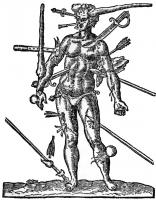 Human hair was already being sold long before capitalism; the sale of human milk was common in ancient Rome and this was even a source of income for many women during the Industrial Revolution. But the first example was not an exchange of commodities in the modern sense, nor in the latter was there any recognition of women as true self-owners. The sale of blood, permitted during most of the twentieth century, was perhaps one of the first generalized ways in which self-ownership left the abstract “straitjacket” of labour power and extended to a physical element of the body, albeit renewable, thus allowing for an additional or last resort income for the most vulnerable self-owners.
Human hair was already being sold long before capitalism; the sale of human milk was common in ancient Rome and this was even a source of income for many women during the Industrial Revolution. But the first example was not an exchange of commodities in the modern sense, nor in the latter was there any recognition of women as true self-owners. The sale of blood, permitted during most of the twentieth century, was perhaps one of the first generalized ways in which self-ownership left the abstract “straitjacket” of labour power and extended to a physical element of the body, albeit renewable, thus allowing for an additional or last resort income for the most vulnerable self-owners.
Body
24.02.2015 | by Bruno Lamas
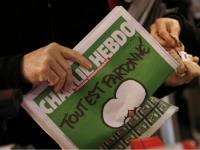 It is simply not acceptable in our day and age to show oneself incapable of truly appreciating the sincere feelings and worldview of others, while at the same time stroking one’s own ego and praising openmindedness and respect for differences at every turn! This inability to look at oneself objectively results from sheer autism.
It is simply not acceptable in our day and age to show oneself incapable of truly appreciating the sincere feelings and worldview of others, while at the same time stroking one’s own ego and praising openmindedness and respect for differences at every turn! This inability to look at oneself objectively results from sheer autism.
Face to face
27.01.2015 | by Boubacar Boris Diop
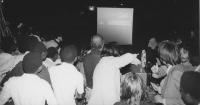 The solo exhibition ‘Monuments in Reverse’ gathers for the first time a set of works by Ângela Ferreira, made between 2008 and 2012, which emerged from the same research-based processes, giving rise, however, to disparate installations whose intimate relationships tend to remain unexplored from a curatorial perspective. With the aim of opening a space of visibility for the conceptual and formal interstices sustaining her practice in general and these works in particular, the exhibition is purposefully documentary and process-based. It intends to shed light on thinking processes more than points of arrival, through the possibility of new connections, or the visibility of previously occluded ones, the strong presence of drawing and video, and the dialogue with works by others which have constituted point of departure or inspiration.
The solo exhibition ‘Monuments in Reverse’ gathers for the first time a set of works by Ângela Ferreira, made between 2008 and 2012, which emerged from the same research-based processes, giving rise, however, to disparate installations whose intimate relationships tend to remain unexplored from a curatorial perspective. With the aim of opening a space of visibility for the conceptual and formal interstices sustaining her practice in general and these works in particular, the exhibition is purposefully documentary and process-based. It intends to shed light on thinking processes more than points of arrival, through the possibility of new connections, or the visibility of previously occluded ones, the strong presence of drawing and video, and the dialogue with works by others which have constituted point of departure or inspiration.
To read
07.01.2015 | by Ana Balona de Oliveira
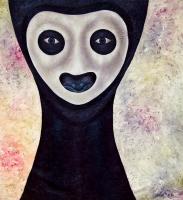 We know that racism is the social, cultural and political result of eurocentrism, which created the need to mark, distinguish and separate racialized ethnic groups of the human community, on the basis of skin color and/or culture. The main leverage associated with this dehumanizing enterprise of racialized ethnic groups was set on the power to construct myths that have always justified racism. In that regard, far from constituting a mere repository of unconscious and harmless prejudices, as it is often made believe, the analysis of the political situation, with the strengthening of fascism and the rise of the far right in Europe, demonstrates that racism remains at the junction of contemporary institutional political practices and the slavocratic, imperial and colonial ideologies.
We know that racism is the social, cultural and political result of eurocentrism, which created the need to mark, distinguish and separate racialized ethnic groups of the human community, on the basis of skin color and/or culture. The main leverage associated with this dehumanizing enterprise of racialized ethnic groups was set on the power to construct myths that have always justified racism. In that regard, far from constituting a mere repository of unconscious and harmless prejudices, as it is often made believe, the analysis of the political situation, with the strengthening of fascism and the rise of the far right in Europe, demonstrates that racism remains at the junction of contemporary institutional political practices and the slavocratic, imperial and colonial ideologies.
To read
29.12.2014 | by Mamadou Ba
 A City Called Mirage is a complex exhibition, by the Angolan artist KILUANJI KIA HENDA (Luanda, 1979), which explores original approaches to a recurring theme in recent times: that of cities between the states of virtuality and desertification. Kiluanji uses (science and mythological) fiction and irony as ways of transcending the pessimism of hyper-criticism and the aesthetics of the ruin. Through humour we are made aware of just how ephemeral the largest human constructions are: all cities will be reduced to raw materials again, just like the metals removed from the ground will once again merge back into it.
A City Called Mirage is a complex exhibition, by the Angolan artist KILUANJI KIA HENDA (Luanda, 1979), which explores original approaches to a recurring theme in recent times: that of cities between the states of virtuality and desertification. Kiluanji uses (science and mythological) fiction and irony as ways of transcending the pessimism of hyper-criticism and the aesthetics of the ruin. Through humour we are made aware of just how ephemeral the largest human constructions are: all cities will be reduced to raw materials again, just like the metals removed from the ground will once again merge back into it.
City
03.10.2014 | by Lucas Parente
 Breyten Breytenbach is a distinguished poet, painter, novelist, playwright, essayist and human rights activist. He is considered one of the greatest living poets in Afrikaans. His literary work has been translated into many languages and he has been honoured with numerous literary and art awards. Having exhibited worldwide he is also a recognized painter, portraying surreal imagery. He was born on 16 September 1939 in Bonnievale and studied art at the Michaelis Art School in Cape Town.
Breyten Breytenbach is a distinguished poet, painter, novelist, playwright, essayist and human rights activist. He is considered one of the greatest living poets in Afrikaans. His literary work has been translated into many languages and he has been honoured with numerous literary and art awards. Having exhibited worldwide he is also a recognized painter, portraying surreal imagery. He was born on 16 September 1939 in Bonnievale and studied art at the Michaelis Art School in Cape Town.
To read
27.08.2014 | by Breyten Breytenbach